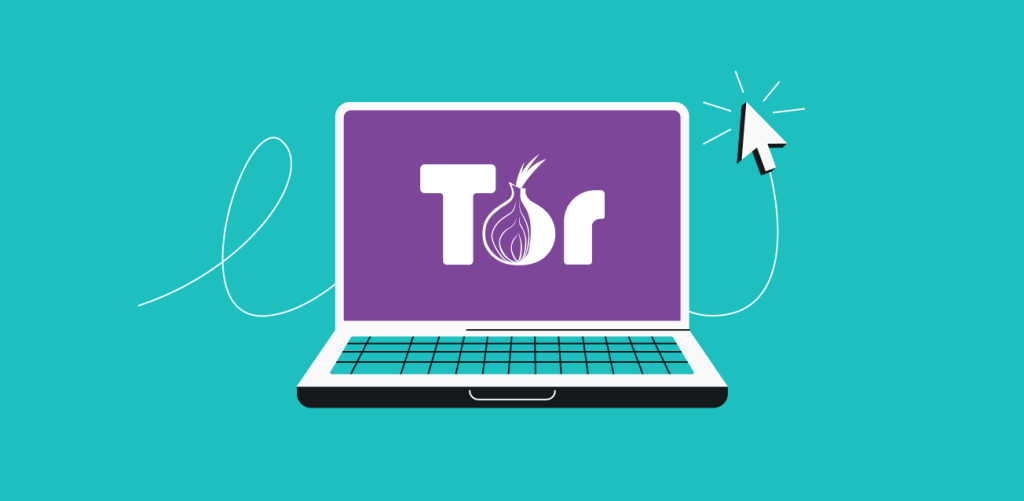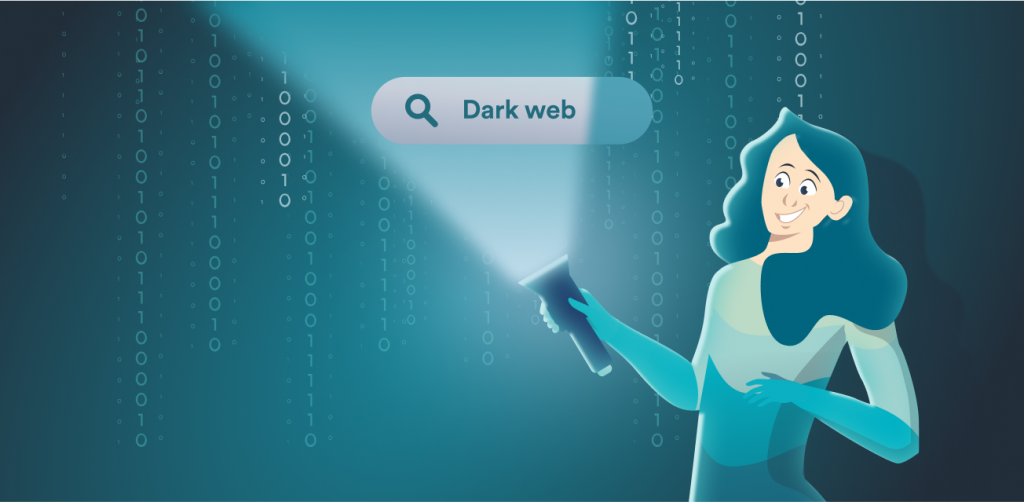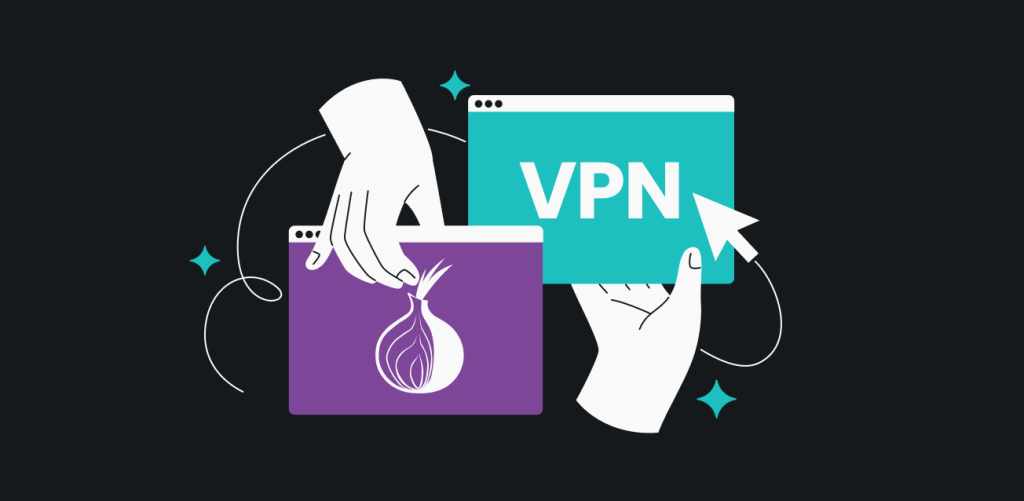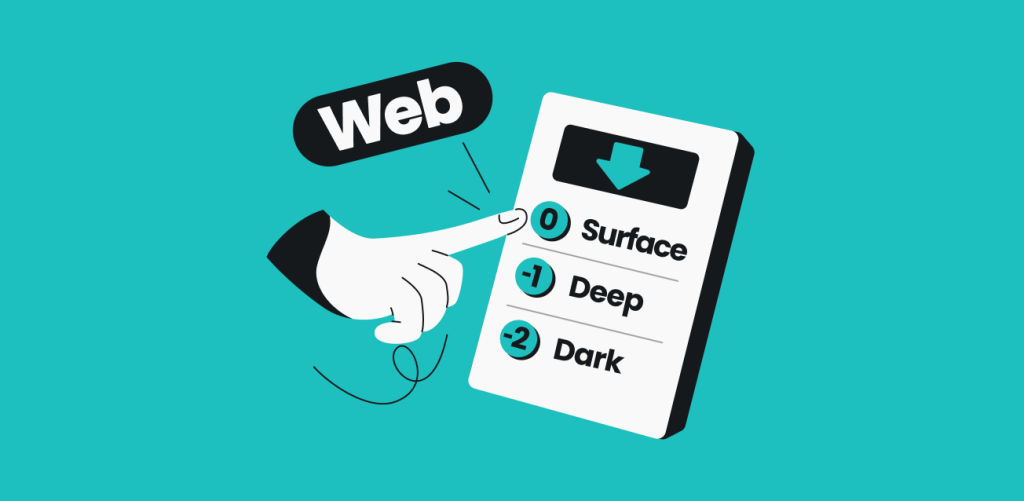
So, you wanna use Tor, The Onion Router?
OK. But do you know what the best — and safest — dark web sites are?
Navigating the dark web is like starting an epic quest — it’s dangerous to go alone.
So take this guide as you explore where to go on the Tor Browser without risking your online security.
Table of contents
What are dark web websites?
Dark web websites are pages that exist on a part of the internet that isn’t indexed by traditional search engines like Google. Also known as deep web sites, these pages typically have URLs ending in .onion and are only accessible through special software like the Tor Browser.
Unlike the surface web, where pages are easily searchable, dark web sites use encryption to hide their IP (Internet Protocol) addresses, making them more difficult to trace. Privacy-focused internet users who access onion sites may see greater anonymity while browsing or sharing sensitive information. These pages can also help circumvent some forms of government censorship.
However, Tor isn’t 100% safe. The deep web is often associated with illegal activity, so it’s important to exercise caution. Suspicious links can expose you to scams, malware, and other dark web dangers. Thankfully, with the right guide — and a tool like a VPN (Virtual Private Network) by your side — you can navigate these hidden sites safely without falling victim to any hazards along the way.
10 best dark web links
The Tor Browser can take you to all kinds of questionable, dangerous, and potentially illegal content. That’s why knowing which dark web websites are safe to visit is vital. These won’t put your data at risk, your device in harm’s way, or you in hot water.
-
The New York Times — globally recognized news coverage

The New York Times operates one of the biggest news sites on the Tor network, letting users access its regular news coverage with increased privacy and security. The onion site is especially beneficial for people in regions with heavy censorship or restricted access to media.
The dark web site is designed to provide a similar experience to the regular New York Times website, with articles, breaking news, and other resources typically available to subscribers. The biggest difference is that the Tor website encrypts users’ internet traffic and anonymizes their connection.
While many dark websites appear sketchy, The New York Times is an exception. It offers reliable news coverage without exposing readers to harmful or illegal material.
-
Wikipedia — Tor’s information powerhouse

Wikipedia manages one of the best Tor sites for encyclopedic knowledge. Not to be confused with the riskier Hidden Wiki page, Wikipedia on Tor serves as a vast repository of information. You’ll find articles on a wide range of topics, such as history, science, and culture — and that’s just scratching the surface.
What makes the dark web version of Wikipedia different? It doesn’t track browsing habits or personal data and won’t expose a user’s identity or location. This makes it safer for those who can’t freely access certain content.
With onion sites like Wikipedia, you can continue learning and gathering information on a wealth of issues, even in places where the standard Wikipedia is restricted or censored.
-
DuckDuckGo — a dark web search engine

DuckDuckGo is a privacy-centric search engine that focuses on user anonymity and data protection. Unlike traditional search engines, it doesn’t track or store personal information, ensuring your searches stay private. It’s a popular choice for users worried about online surveillance and data collection.
You can access DuckDuckGo on the surface web, but a Tor version is also available. You’ll get unbiased, organic search results without getting any of your browsing behavior logged. Using DuckDuckGo over Tor will also let you see onion sites and normal pages in your search results.
DuckDuckGo is a reputable US-based software company, so their Tor site itself is safe to use. That said, you still might get malicious links in your search results, so you still need to proceed with caution with any page DuckDuckGo takes you to.
-
Ahmia — another Tor search engine

Unlike DuckDuckGo, Ahmia is a search engine built expressly for a dark web browser. Users can explore onion sites easily and search for content without having to know any specific onion links in advance. You’ll keep your identity private while getting results for various Tor websites, forums, and marketplaces.
Ahmia also discourages access to illegal content and promotes safer internet practices. Confidential government files and pages tied to unlawful trafficking often get filtered out. However, Ahmia doesn’t have a large developer supporting it, so it’s been the target of scams or cyberattacks in the past.
-
ProPublica — investigative journalism on Tor

ProPublica is a non-profit investigative journalism outfit based out of New York City. It’s committed to transparency and public service, which is why it maintains a dark website along with its site on the surface web.
Accessing ProPublica via the Tor Browser gives users an added layer of privacy and lets them bypass restrictive government censorship. This is especially important for individuals in regions where press freedom is restricted or where government surveillance poses risks to journalists and activists.
ProPublica is independent, so you’ll find trustworthy news reports on topics ranging from corruption to inequality and environmental issues. As a bonus, the site is one of the most polished on the deep web, so you shouldn’t get a clunky experience that feels sus.
-
Riseup — communication tools for activists

Riseup provides email and chat services that keep no record of your online activity. It’s maintained by a volunteer-run collective from the USA that protects the platform from malicious attacks and pledges to support social justice and progressive causes.
Riseup’s secure email and chat help individuals communicate without fear of surveillance or data interception. Since the organization behind it is independent, it’s fully user-supported and relies on donations to keep its site up and running. All of this underscores Riseup’s prioritization of users’ rights over business interests.
Riseup is available on the surface web, but its presence on the Tor network extends its privacy benefits by letting you use its services without exposing their real-world identities. You can access encrypted email services through the onion site without getting tracked. This makes Riseup a vital tool for people in oppressive environments or anyone concerned with online privacy.
-
Hidden Answers — anonymous questions and answers

Hidden Answers is one of the biggest question-and-answer dark web sites. It’s similar to Reddit or Quora but designed for anonymous users. Users can ask questions, share answers, and engage in discussions without revealing their identities.
Hidden Answers covers various topics, including political debates, technical questions, and personal advice. Its private nature makes it useful for those seeking genuine advice or meaningful conversations on topics they may feel uncomfortable discussing elsewhere.
Although Hidden Answers offers an outlet for anonymous dialogs, users should stay cautious while browsing. Posts on controversial or even illegal topics are fair game, so the Tor website is a double-edged sword. This space for private free speech also carries the risk of exposing you to harmful content.
Note: An extra layer of security is always welcome when using such websites, especially if you plan on asking some personal questions yourself. With a VPN, your data gets encrypted before it ever reaches the Tor network. Check out the video below to find out exactly how and why you should use a VPN with Tor.

-
Tor Metrics — statistics on the dark web

Tor Metrics is a dark web site that keeps track of who’s using the Tor network and where they’re accessing it. It’s an interesting resource that translates Tor internet traffic levels into easy-to-digest stats.
What kind of stats are we talking about?
Tor Metrics highlights that about 22% of daily Tor users come from Russia, while the USA ranks second at 15%. Tor has around 2 million daily users exploring over 65,000 onion sites.
Insights like these help researchers and advocates understand how and why Tor is being used. With this info, the wider online community can grasp Tor’s impact and its ability to provide secure and anonymous internet access.
-
ZeroBin — the secure way to share your pastes

ZeroBin is a minimalist paste-bin tool that allows users to share text securely and privately on the Tor network. ZeroBin encrypts any text pasted into it, and its own servers don’t even know what you pasted. You’ll be able to share anything from private messages to passwords across the dark web.
ZeroBin is an attractive option for anyone looking to share sensitive information without compromising privacy. It’s particularly useful for journalists, whistleblowers, and those who urgently need to send or receive confidential data.
ZeroBin’s onion address ensures your traffic is routed through multiple nodes, so it’s challenging for any third party to trace any message back to your original location. Users get a secure, user-friendly platform that caters to individuals who prioritize privacy online.
-
SecureDrop — safer communication

SecureDrop is an open-source platform that facilitates secure communication between whistleblowers and journalists. Developed by the Freedom of the Press Foundation, the dark web site allows users to privately submit documents and sensitive materials without revealing their identity.
SecureDrop is designed explicitly for journalists trying to preserve the privacy of their sources. Its anonymous nature enables users to create and submit encrypted documents, chat securely, and receive private responses from journalists.
SecureDrop has even been adopted by various news organizations worldwide. It provides a safe haven for anyone looking to shed light on wrongdoing or share critical information with the media.
What threats are on the dark web?
The dark web is the Wild West of the internet — exciting to explore but potentially dangerous. Here are some threats you might run into:
- Scams: since most Tor websites are non-indexed and unregulated, the probability of scams is much greater on the dark web. Malicious actors can prey on unsuspecting users without leaving much of a digital footprint on Tor, so it’s often just a matter of time before you run into one;
- Dangerous software: viruses, ransomware, and other types of malware are more common on onion sites than on the normal internet. Many pages have poor encryption standards and no other protections, so simply visiting a Tor site can infect your device;
- Government monitoring: yes, governments can still monitor onion sites if they really want to. Local offices frequently monitor suspicious activities that involve their jurisdictions, so authorities might be closer to your anonymous communication than you know;
- Illegal markets: many dark web links will get you mixed up in some kind of criminal activity of another, whether you’re looking for it or not. The deep web is rife with sales of illicit drugs, weapons, and goodness knows what else, and steering clear of these nefarious web pages is easier said than done;
- Identity theft: you may want to use Tor to access the dark web safely, but there’s a good chance you’ll rub shoulders with hackers and snoops trying to steal your login credentials, Social Security number, or financial data.
Given the above threats, it’s a good idea to use Tor over a VPN to access the dark web.
How to stay safe on the dark web
To explore the dark web safely, it’s a good idea to stick to these tried and true tips:
- Use a VPN: always turn a VPN on before opening any Tor links. A VPN like Surfshark encrypts your internet connection and makes it harder for others to see your real IP address. This adds another, more reliable security layer to all of your online activity;
- Update your Tor Browser: regular updates help fix security vulnerabilities. Visiting onion sites on older Tor versions can needlessly expose you to added risks;
- Use MFA (Multi-Factor Authentication): enable MFA wherever possible to protect your accounts from unauthorized access;
- Avoid sharing personal information: info like your name or email address never needs to be shared on the dark web. You should also limit the number of financial transactions you make on Tor banking portals. Stay private with a tool like Surfshark’s Alternative ID to mask your contact details and use generated data on sites you don’t trust;
- Stay away from questionable sites: apart from the best onion sites listed here, you must be careful with the Tor pages you visit. Search engines and corporate websites might be OK, but even a popular Tor website like Hidden Wiki can show illegal deep web links that jeopardize your online safety.
Disclaimer: Please note that using Surfshark services for any illegal activities is strictly forbidden and violates our Terms of Service. Make sure that any use of Surfshark services for your particular activities conforms to all relevant laws and regulations, including those of any service providers and websites you access using Surfshark.
Enjoy more secure browsing with a VPN
While the best dark web sites listed above are a good starting point for a safe, legal surfing experience on Tor, there really is no substitute for a VPN.
A VPN connection is key to gaining greater privacy, security, and freedom on and off the dark web. With its range of cybersecurity bundles, Surfshark is an excellent choice.
Try Surfshark — complete with a 30-day money-back guarantee — to elevate your browsing experience today.
FAQ
Is the dark web illegal?
No, it isn’t illegal to browse the dark web, and there’s nothing inherently wrong with visiting a Tor website. The dark web is just a part of the internet where users can communicate and browse privately, often beyond the reach of standard government monitoring. In fact, you can even find many government and corporate websites on the dark web.
However, there’s a chance you may run into illegal activity on all but the best onion sites. Most internet users want to use the dark web safely, but it’s still important to be careful when using any onion browser.
What is the best dark web search engine?
Many dark web search engines are available, and no single option is objectively the best. That said, you have some reliable candidates to choose from. Both DuckDuckGo and Ahmia are safe choices for finding Tor Browser links without being tracked. Any onion websites you visit from these search engines is another story. Unless you know where you’re going, there’s always some risk connected to clicking on dark web search engine links.
How do I know if I am on the dark web?
You can tell you’re on the dark web if you’re accessing websites with .onion addresses on the Tor Browser or a similar anonymity network. These sites aren’t accessible via standard web browsers or search engines. Fortunately, you can’t just stumble onto dark web websites by accident. You need to download and open Tor to browse the dark web.
How dangerous is it to click on random onion links?
Clicking on random onion links is quite risky and isn’t recommended. A random dark web link can lead you to malicious software, phishing sites, and illegal content. That’s why it’s important to verify links through trusted directories and proceed with caution.
Can I access the dark web on mobile?
Yes, you can access the dark web on mobile — you just need the right app. Android users need to download the Tor Browser app, while iPhone fans should get the Onion Browser app.
Can I use a free VPN to access the dark web?
Yes, you can use a free VPN on the dark web, but a VPN isn’t needed to reach the dark web. Either way, using a free VPN is never recommended. Many free VPN providers lack basic security features and track your online activity, so they don’t offer much privacy.





